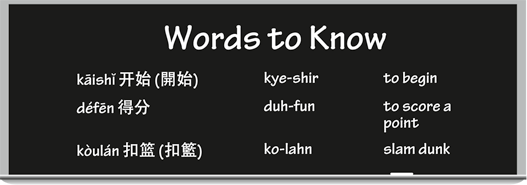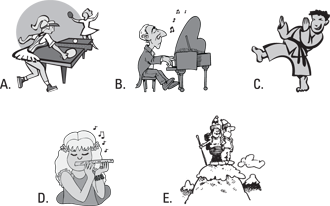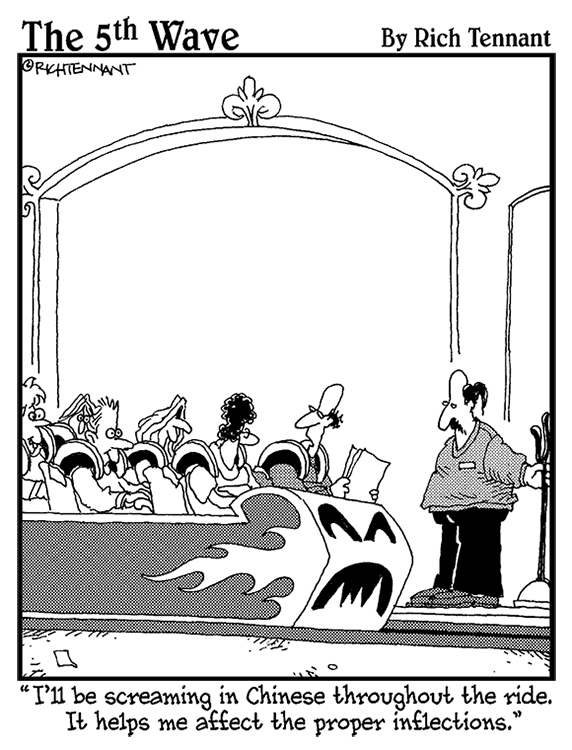Chinese For Dummies (97 page)
Read Chinese For Dummies Online
Authors: Wendy Abraham
Ernest:
BÇsà i shénme shÃhòu kÄishÇ?
bee-sye shummuh shir-ho kye-shir?
When does the game begin?
Cecilia:
Kuà i yà o kÄishÇ le.
kwye yaow kye-shir luh.
It's going to start soon.
A few minutes later, the game finally begins.
Ernest:
Wà ! TÄ méi
tóuzhòng!!
wah! tah may toe-joong!
Wow! He missed the shot!
Cecilia:
Méi guÄnxi. Lìngwà i nèige duìyuán gÄng gÄng kòulán défÄn.
may gwahn-she. leeng-why nay-guh dway-ywan gahng gahng ko-lahn duh-fun.
It doesn't matter. That other player just scored with a slam dunk.

 Â Fun & Games
 Fun & Games

What are the people in the pictures doing? Use the correct verb in your response. (See
Appendix D
for the answers.)
A. ___________________
B. ___________________
C. ___________________
D. ___________________
E. ___________________
Part III
Chinese on the Go

In this part . . .
A
h, to travel the world! These chapters help you with every aspect of your travel, from getting a visa and making hotel reservations to deciphering foreign currency, asking for directions, and getting to your destination. I even include a chapter on handling emergencies, although I hope you never have to use it. Yà lù pÃng'Än!
路平å®
! (ee loo peeng-ahn!) (Bon voyage!)
Chapter 14
Planning a Trip
In This Chapter
 Checking your calendar for open dates
Checking your calendar for open dates
 Planning around Chinese holidays
Planning around Chinese holidays
 Choosing a travel destination
Choosing a travel destination
 Filling your luggage
Filling your luggage
 Dealing with travel agents
Dealing with travel agents
C
areful planning is the key to a successful vacation or business trip. You have to keep in mind not only where you want to go but also the best time to travel. This chapter tells you how to prepare for a trip abroad and how to choose the exact day, date, and year you want to travel. When it comes to making sure your
hùzhà o
æ¤ç
§
(
è·ç
§
) (hoo-jaow) (
passport
) is still valid and your
qiÄnzhèng
ç¾è¯
(
ç°½è
) (chyan-juhng) (
visa
) is in order, however, you're on your own.
Yà lù pÃng Än!
ä¸è·¯å¹³å®
! (ee loo peeng ahn!) (
Have a good trip!
)
Talking about When You Want to Travel
The time of year you choose to travel can make all the difference in the world for a great (or lousy) vacation. A trip to Beijing during March, just when the dust storms are blowing in from the Gobi Desert, for example, is quite different from a trip during May or October, when pollution is at a minimum and sunny skies are at a maximum. Of course, May and October are peak seasons to travel to China for exactly these reasons, which means hotel prices are also at their peak. Paris in the spring is just as great (and just as expensive) for the same reason. Can't do much to help you there. For more on all things related to dates and seasons, head to
Chapter 5
.
Want to find out when friends plan to leave on their vacation? Just ask them one of these basic questions:
 NÇ jÇ yuè jÇ hà o zÇu?
NÇ jÇ yuè jÇ hà o zÇu?
ä½ å æå å·èµ°
? (
ä½ å¹¾æå¹¾èèµ°
?) (nee jee yweh jee how dzoe?) (
When are you leaving?
[Literally:
What month and day are you leaving?
])
 NÇ jÇ yuè jÇ hà o qù ZhÅngguó?
NÇ jÇ yuè jÇ hà o qù ZhÅngguó?
ä½ å æå å·å»ä¸å½
? (
ä½ å¹¾æå¹¾èå»ä¸å
?) (nee jee yweh jee how chyew joong-gwaw?) (
When will you be going to China?
[Literally:
What month and day will you be going to China?
])
If you have to answer the preceding questions, just fill in the month and the number of the day you plan on leaving and put those words in place of
yuè
and
hà o.
Here are some examples:
WÇ wÇ yuè sÄnshà hà o zÇu.
æäºæä¸åå·èµ°
. (
æäºæä¸åèèµ°
.) (waw woo yweh sahn shir how dzoe) (
I'm leaving on May
30.
)
WÇ sÄn yuè yÄ« hà o qù ZhÅngguó.
æä¸æä¸å·å»ä¸å½
. (
æä¸æä¸èå»ä¸å
.)
(waw sahn yweh ee how chyew joong-gwaw) (
I'm going to China on March 1.
)
Bet you can't wait to start making those travel plans now!
Celebrating the Chinese Holidays
 If you travel to China during 2013, you arrive during
If you travel to China during 2013, you arrive during
shé nián
èå¹´
(shuh nyan) (
Year of the Snake
). Want to travel in later years instead?
 2014:
2014:
mÇ nián
马年
(
馬年
) (ma nyan) (
Year of the Horse
)
 2015:
2015:
yáng nián
ç¾å¹´
(yahng nyan) (
Year of the Sheep
)
After the sheep, the following animals come calling:
hóu
ç´
(ho) (
monkey
),
鸡
(
é
) (jee) (
rooster
),
gÇu
ç
(
ç
) (go) (
dog
),
zhū
çª
(
豬
) (joo) (
pig
)
, shÇ
é¼
(shoo) (
rat
),
niú
ç
(nyo) (
ox
),
hÇ
è
(hoo) (
tiger
),
tù
å
(too) (
rabbit
), and finally the
lóng
é¾
(
é¾
) (loong) (
dragon
) before the snake comes around again. It's the rat, though (not the snake), who starts the whole new 12-year cycle.